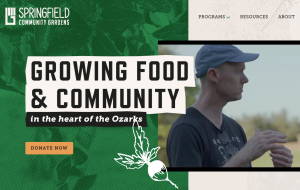“Our Food: Our Stories” oral history series to preserve experiences of Ozarks farmers

The Missouri Humanities Council (MHC) has awarded a grant of $7,000 to Springfield Community Gardens in support of the project, “Our Food: Our Stories”. The MHC is the only state wide agency in Missouri devoted exclusively to humanities education for citizens of all ages. It has served as a state affiliate of the National Endowment for the Humanities since 1971. Springfield Community Gardens is sponsoring this progroject in partnership with Missouri Humanities and with support from the Missouri Humanities Trust Fund.
Stories of the Missouri Ozarks’ agricultural heritage will be recorded for the future through a new oral history project from Springfield Community Gardens, Missouri State University Libraries, and the MSU Ozarks Poverty Working Group.
“Our Food: Our Stories” will feature at least 15 oral history interviews from a diverse group of farmers across the region. Particular emphasis will be on recording the stories of indigenous people, as well as immigrants, veterans, those who are underserved, the socially disadvantaged, and individuals of color, as well as beginning farmers.
“Small farming has a rich history in the Ozarks and it is important to capture these stories of re-localizing our food economy so that they can be passed on from generation to generation,” says Maile Auterson, fourth-generation Ozarks farmer and Founding Director of Springfield Community Gardens.
The MSU Libraries is also giving in-kind support through the production of several of the oral history interviews, and will make the recordings publicly available online as part of its ongoing oral history collection.
“Oral histories are an important way to learn about a topic or region, both for our world today and in the future,” says Tom Peters, dean of MSU Libraries and director of the Ozarks Studies Institute. “This project is a key way to document what farming looks like in the region, especially as the legacy industry continues to grow and evolve.”
The Ozarks Poverty Working Group at Missouri State University is housed in the Sociology and Anthropology Department, and its members will also be collecting interviews as part of the project. “Narratives allow people to give shape and meaning to their experiences. People tell stories to link meaningful moments from their own lives with those of others, inviting a more dynamic conversation through the sharing of memory, perspective, and community,” says Erin Kenny, co-director of the working group and Associate professor of Anthropology at Missouri State.
In addition to ultimately being available online, information gleaned from the interviews will take the national stage in late June and early July 2023 during the Ozarks Program at the Smithsonian Folklife Festival in Washington D.C.
The MSU Libraries is the lead partner for “The Ozarks: Faces and Facets of a Region,” one of the festival’s programs that includes significant emphasis on traditions related to local food growing and gathering. Stories may also be used in other forms of communication and education through the Smithsonian Digital Stories project.
For more information about the grants program of the Missouri Humanities Council, call 314/781-9660 or 800/357-0909 or write to the MHC, 415 S 18th Street, Suite 100, St Louis, MO 63103-2269